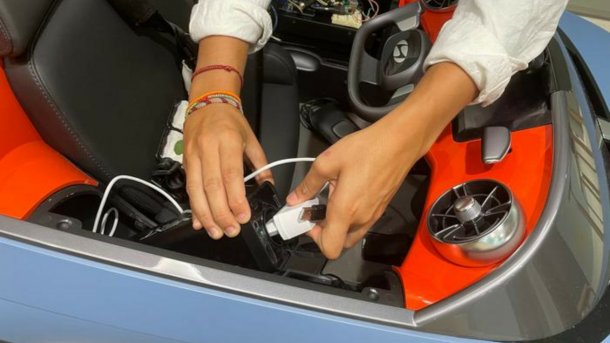Robotic vehicle to reduce stress in children before medical procedures
Children's fear of surgery is to be taken away by a robotic vehicle that drives them to the operating room. Emotions are evaluated by AI.

The robot vehicle is being prepared.
(Bild: Àgata Lapedriza / Universitat Oberta de Catalunya (UOC))
In a pilot project, an international research team in cooperation with the Sant Joan de Déu Children's Hospital in Barcelona has developed and tested a robotic vehicle designed to relieve stress and anxiety in children between the ages of three and ten before a medical procedure. The scientists wanted to find out whether the administration of stress-reducing medication could be reduced or avoided altogether.
"Children are admitted to a hospital, which is already an unpleasant environment for them, and they have to go with people they don't know, such as medical staff, and undergo unpleasant procedures, such as an injection. All of this leads to stressful situations that can lead to chronic pain in the long term," says Jordi Albo, Scientific Director of Lighthouse DIG and co-initiator of the project.
AI detects emotions
The scientists describe the stress-reducing robotic vehicle in the study "Deploying a Robotic ride-on Car in the Hospital to Reduce the Stress of Pediatric Patients before Surgery", which was published in HRI '24: Companion of the 2024 ACM/IEEE International Conference on Human-Robot Interaction. According to the paper, the robot is equipped with various sensors that make it possible to record the child's facial expression, heart rate and breathing. The data is analyzed using artificial intelligence (AI). The robot uses the indicators of a child's well-being to help the child relax. For example, while it drives the child to the operating room, it plays music, changes its color and generates smells that have a positive effect on the child's well-being. In addition, the robotic vehicle, which was built by car manufacturer Hyundai, has an interface with which the children can interact with the robot.
The project is an example of affective computing, "which is about developing AI systems that can perceive emotions, understand emotions and respond to emotions in an emotionally intelligent way," says Àgata Lapedriza, researcher at the Universitat Oberta de Catalunya (UOC), member of the Faculty of Computer Science, Multimedia and Telecommunications and head of the Artificial Intelligence for Human Wellbeing (AIWELL) research group at the UOC's eHealth Center.
Reducing stress in children before medical procedures
The researchers tested the robotic vehicle in real cases at the children's hospital. The results showed positive effects on the children and their parents. The child had the feeling of playing an active role in the driver's seat of the robotic vehicle and being in control. They had fun and the accompanying parents observed that their child was less anxious.
The scientists want to use the results of the study to revise the robotic vehicle. In particular, they will decide which sensors are necessary and which can be omitted. They also want to evaluate which actions are useful and which can be omitted. However, a lack of funding is currently preventing the project from being continued.
(olb)